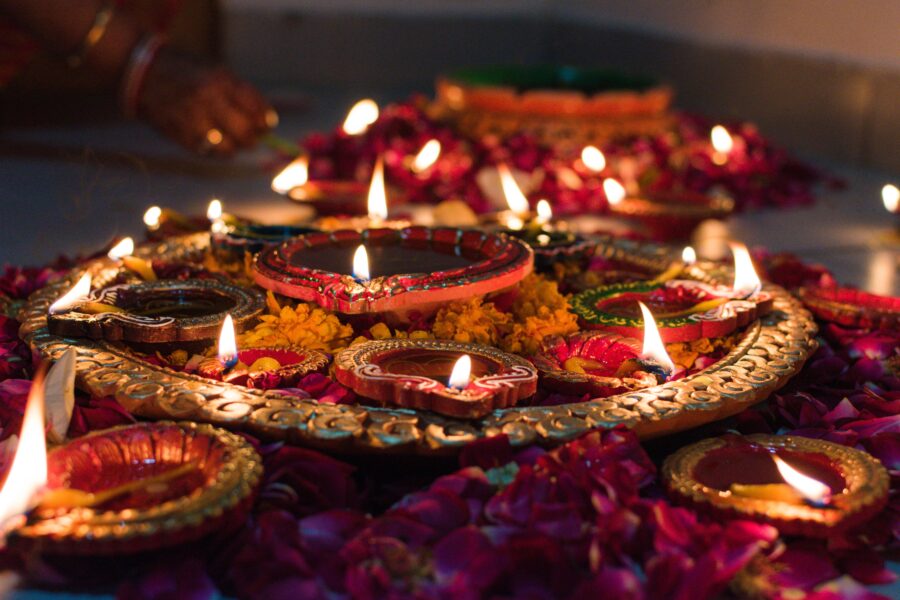
Diwali is the Hindu festival of Lights. It is culturally celebrated to commemorate the win of good over evil. The lighting of small decorative and colourful lamps called ‘diyas’ and the making of artful designs called rangolis symbolise the warding of evil energies and the welcoming of prosperity, success, and good energy. It is also celebrated as the start of a new year by the Hindus. The Diwali festival serves as a reminder for followers of Hinduism to maintain their dharma (duty) in day-to-day life. The five-day celebration is quintessentially the most awaited festival of the whole year. People dress in traditional Indian attire called Saris, Kurtas, Salwars and Lehengas and celebrate the festival amidst hot, piping food complimented by mouthfuls of delicious Indian sweets. The memo to celebrate Diwali is for everyone to take a break from the hassles of life and come together as a family, and community to remember why festivals like Diwali are celebrated in the very first place.
The five-day celebration is quintessentially the most awaited festival of the whole year.
Indian Diaspora is a strong identity and is a special homage to the people and country they represent, India. Since the UK has predominantly more Indians in its international student population, it is obvious that Diwali celebrations in the UK are more than just pomp and show. The University of Exeter has three cultural societies called the Exeter Indian Society, The Exeter Hindu Society and the Asian Society which come together every year to celebrate the festival of Diwali on the campus with great enthusiasm. The celebration ranges over days, following the traditional way of celebrating Diwali over a range of days.
Students come together for the lighting of diyas, chant Hindu hymns and songs, make extensive designs of rangoli, distribute food and sweets amongst themselves and have a gala time witnessing the annual placement of Diwali fireworks. Entertaining Bollywood performances are arranged by the student committees of these societies and arrangements are also made where individuals can try their hands at poker and cards. Music and dance form the most important form of decoration when it comes to celebrating Diwali. The essence of coming together people from all walks of life, to celebrate the primordial idea of striving always for the win of truth over evil, also gives away the feeling of encouragement amongst all participating in this festival.
Students often miss home during this time of the year. The celebration of festivals like Diwali on a wide scale gives the feeling of a home away from home, where it is celebrated with great flamboyance and zealousness. Some places that celebrate Diwali in Exeter are the Exeter Hindu Cultural Centre and the Royal Albert Memorial Museum. Indians who have permanently migrated to the UK or who residing here for a long time, find the fulfilment of the feeling of missing the enormity of celebrating Diwali back in India, by celebrating at the Cultural Centre following traditional Hindu customs. Diwali as a festival encourages the feeling of inclusion and the habit of being benevolent and kind. There is a constant buzz of fireworks and music during these days and the town seems to be awake for a bit during this festival which falls in the slumber months of autumn. The food which essentially represents sweets and hot spicy Indian bread and curries symbolises the spreading of warmth and handmade love amongst all who consume it. Originally a Hindu festival, Diwali has transcended religious lines. Diwali is celebrated by Hindus, Jains, Sikhs, and Buddhists, although each faith it marks different historical events and stories, the festival represents the same symbolic victory of light over darkness, knowledge over ignorance, and good over evil. Wish you a happy and prosperous Diwali. May this new year light up your homes and your soul evermore!


